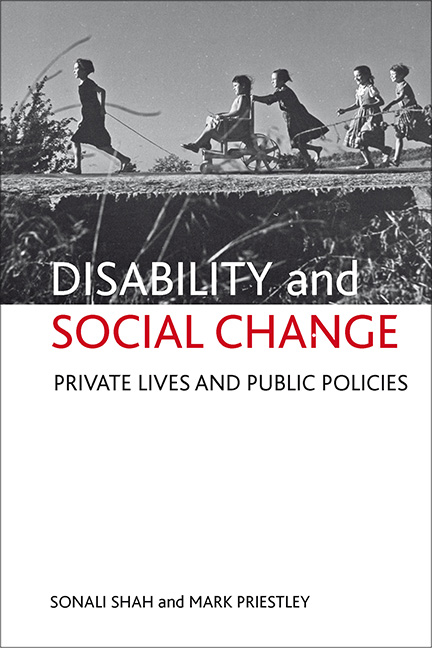two - Telling stories
Published online by Cambridge University Press: 01 September 2022
Summary
As explained in Chapter One, this book examines how life has changed for young people with physical impairments in England over three generations, and how public policies have affected this. However, as (Priestley, 2001, p 240) points out, ‘life can be a complex, often messy, business and people's life experiences do not fit neatly into academic disciplines or theoretical models’. The focus here is on those real lives rather than the constructed boundaries of policy making. The chapter introduces the three generational cohorts of disabled people who contributed their life stories. These are illustrated by six vignettes (summary life stories), which were agreed and validated by those who told their stories at much greater length. After each pair of vignettes (two from each generation) there is discussion of the issues they raise. These are then explored in more detail in the thematic chapters that follow.
The examples provide a flavour of the experiences and remembrances explored in the interviews. It is not the intention here to produce definitive biographies or case studies, or to tell the ‘whole story’, but to illustrate the range of experiences and to prompt questions about relationships between private lives and public policies. For example, the stories illustrate connections between medical treatment, education, employment, family relationships, self-identity and disability politics.
Children of the 1940s
Those in the oldest generation were born around the time of Second World War or shortly after and grew up with the first attempts to address disability more systematically in British social policy. In particular, they and their families negotiated experiences of disability during the emergence of the post-war welfare state (for example, in relation to radical new legislation on employment, education and health services in the wake of the Beveridge Report, as highlighted in Chapter One).
Florence
Florence was born in the late 1940s, the daughter of a single parent, but when doctors diagnosed that she would never walk, her birth mother left her. At the age of one, she spent a year in a hospital before being placed in a children's home and with foster families. However, they were unable to cope with a child with physical impairments, and Florence was picked on in the children's home, so she was sent back to hospital ‘because there was nowhere else’.
- Type
- Chapter
- Information
- Disability and Social ChangePrivate Lives and Public Policies, pp. 23 - 46Publisher: Bristol University PressPrint publication year: 2011



